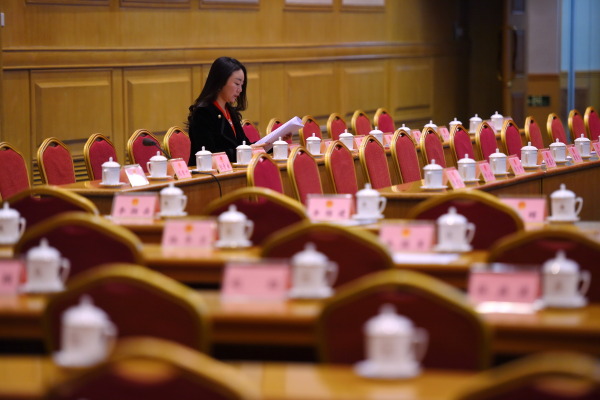English-Français
អន្តរជាតិ

×![]()
ដោយ: Xinhua
BEIJING, March 16 -- As China is embracing the 40th anniversary of its reform and opening up, the country is also building unprecedented confidence in its own definition and application of "democracy," a word introduced to China about a century ago.
Over the past five years, China's GDP grew to 82.7 trillion yuan (13.1 trillion U.S. dollars) from 54 trillion yuan, increasing its percentage of global GDP from 11.4 percent to 15 percent. About 68 million people in rural areas were lifted out of poverty. Now the country has the world's largest middle-income population.
The success story is largely attributed to political stability and vitality under Chinese democracy, which is being highlighted at the ongoing "two sessions" when lawmakers and political advisors gather in Beijing to discuss the country's development for the following years.
The National People's Congress (NPC), the highest organ of state power, has made revisions to the Constitution, which will act as a fundamental guarantee for China's modernization drive. It will also elect state leaders and confirm the nomination of state leaders. All these moves run smoothly with due democratic procedures.
This is in sharp contrast to a century ago when the nation began to learn about "democracy," but soon found the Western politics did not work here. Decades of turmoil and civil war followed.
It was after the founding of the People's Republic of China that the country developed its own style of democracy. The first NPC was convened in 1954, marking the establishment of the people's congress system, the platform for democracy where the people exercise state power.
This is a political system fundamental to the leadership of the Communist Party of China (CPC), the running of the country by the people, and law-based governance.
POWER OF THE PEOPLE
NPC deputy Zhang Xiaoqing suggested at the annual session last year that migrant workers, a group numbering 286.5 million that is vital to China's urbanization drive, should receive unemployment insurance when they lose jobs in cities.
"Farmers leave their families to work for higher salaries in the cities, but many of them face the daily risk of losing their jobs," Zhang said. "We must ensure the bottom line is protected for their life and their families."
She was glad that the suggestion was received well and accepted by the government. The Ministry of Human Resources and Social Security is revising a regulation to give migrant workers the same access to unemployment insurance as urban employees.
For the first time, the central government used the indicator of "surveyed urban unemployment rate" which covers rural migrant workers and other permanent residents, as a projected target.
Zhang was reelected as a deputy to the 13th NPC. "My duty is to speak for the people on every aspect of the country's development," she said.
Over the past five years, NPC deputies have raised more than 41,000 suggestions, mostly focusing on supply-side structural reform, defusing potential major risks, targeted poverty alleviation, and environmental protection, which are crucial to achieving high quality development. All the suggestions have been responded to by the concerned departments.
Once the right to run the country is ensured, the people's creativity can be sparked. Blessed with the strength of more than 1.3 billion people, the nation will have an infinitely vast stage in the world, said Xin Ming, a professor at the Party School of the CPC Central Committee.
As the top legislature, the NPC and its standing committee have played the leading role in lawmaking.
Over the past five years, the top legislature has enacted 25 laws, revised more than 100 laws, and passed 46 decisions or resolutions on legal issues. All these legislative moves focused on key areas of China's development and stability.
NPC Deputy Sun Xianzhong, a law researcher at the Chinese Academy of Social Sciences, was proud to participate in compiling China's first civil code, a "must-do" to promote the country's rule of law and modernize state governance.
In 2013, he raised a suggestion on revising the 1986 version of the general principles of civil law and compiling a civil code. The suggestion was accepted by the legislature. Last year, the NPC adopted the draft general provisions, a crucial step for China to have a civil code by 2020.
"The move allows the Chinese people to feel more secure about their rights and enjoy more equal development opportunities," Sun said.
In contrast to the checks and balance of power that frequently result in political stagnation in some Western countries, China's central government, the Supreme People's Court, and the Supreme People's Procuratorate answer to the NPC and are supervised by it. This vertical design has the advantages of uniting different forces in governance and avoiding internal friction.
China also brings legislature into line with the country's reform which is key to promoting development.
For instance, the top legislature issued decisions in 2013 and 2014 on pilot free trade zones and elevated the reform measures tested in the zones into provisions of law after the government gained experience from the trials. Now China has 11 free trade zones which have encouraged more foreign enterprises to operate in the country.
At the on-going NPC session, lawmakers are mulling establishing a national supervisory commission to better ensure development with enhanced anti-graft efforts.
CONSULTATIVE DEMOCRACY
Chinese democracy goes far beyond electoral democracy, and includes consultation as a virtue. It occurs in every corner of the country.
There are more than 2,100 political advisors to the 13th National Committee of the Chinese People's Political Consultative Conference (CPPCC), the top political advisory body, representing all of the 56 ethnic groups of China. About 60 percent of these political advisors are not members of the CPC. The list also includes entrepreneurs, artists and scholars, among others.
Before Chinese Premier Li Keqiang delivered the government work report to the NPC, several rounds of seminars were held to consult representatives from all walks of life on the draft report. Chinese leaders also listened to lawmakers and political advisors' opinions on the report in a face-to-face manner before it was submitted for approval.
Over the past five years, the non-communist parties have launched a series of supervisory investigations on issues such as health care, education, regional economic integration, and poverty reduction.
The investigation reports often go directly to the CPC Central Committee or the State Council and many helped in formulating policies and laws, according to Wan Exiang, chairperson of the Central Committee of the Revolutionary Committee of the Chinese Kuomintang.
Consultative democracy also includes self-governance at the grassroots level through village committees.
According to China's Organic Law of Village Committees, self-governance in rural areas is ensured with elections conducted, decisions adopted, administration maintained and supervision exercised by democratic means.
The village committees manage the public affairs and public welfare undertakings, mediate disputes, help maintain public order, and convey the villagers' opinions and demands and make suggestions to the government.
For Wang Wenming, 50, head of Maoyang Village in east China's Zhejiang Province, full consultations can lead to reversal of public opinions.
The village intended to undertake renovations in 2016, including cleaning up polluted rivers and waste. However, during the first consultation no progress was made.
"Why should we spend so much money on renovations? A village should be a village," some argued.
"The program cannot be carried out without the approval of most villagers," Wang said.
Party members then frequently explained the need to create a healthy living environment and took the lead in neighborhood renovations.Gradually, most villagers were persuaded, giving their approval at the second democratic meeting. The renovation program was completed in June last year and earned much praise.
As the rule of law is promoted in the countryside, the country has seen a new generation of farmers who have a deeper understanding of democracy, said Xu Yong, a professor at China Institute of Rural Studies at Central China Normal University.
CAPABLE GOVERNMENT
Democracy is not a decoration, but a means of solving problems.
China has a long political tradition of selecting and appointing talent, establishing a merit-based "selection plus election" system with a special focus on public opinion. The items for assessment include, but are not limited to, economic development, job creation, social security, and environmental protection.
The system works. Capable cadres are selected and elected to serve the people.
The Chinese government scored highest in a poll of 27 countries on public trust, with about 84 percent of Chinese having trust in the government, the 2018 Edelman Trust Barometer survey found.
The true meaning of people's democracy is finding the best way to coordinate the aspirations and demands of the whole of society and making decisions that conform to the long-term interest of the people, said Xu Yaotong, professor with the Chinese Academy of Governance.
China's socialist democracy is the broadest, most genuine, and most effective democracy to safeguard the fundamental interests of the people, according to the report to the 19th CPC National Congress held in October.
For Li Shimo, a venture entrepreneur based in Shanghai, China's success has shown there is more than one model of democracy in the world that can produce good governance. "China's example shows alternatives exist."
© រក្សាសិទ្ធិដោយ thmeythmey.com






















